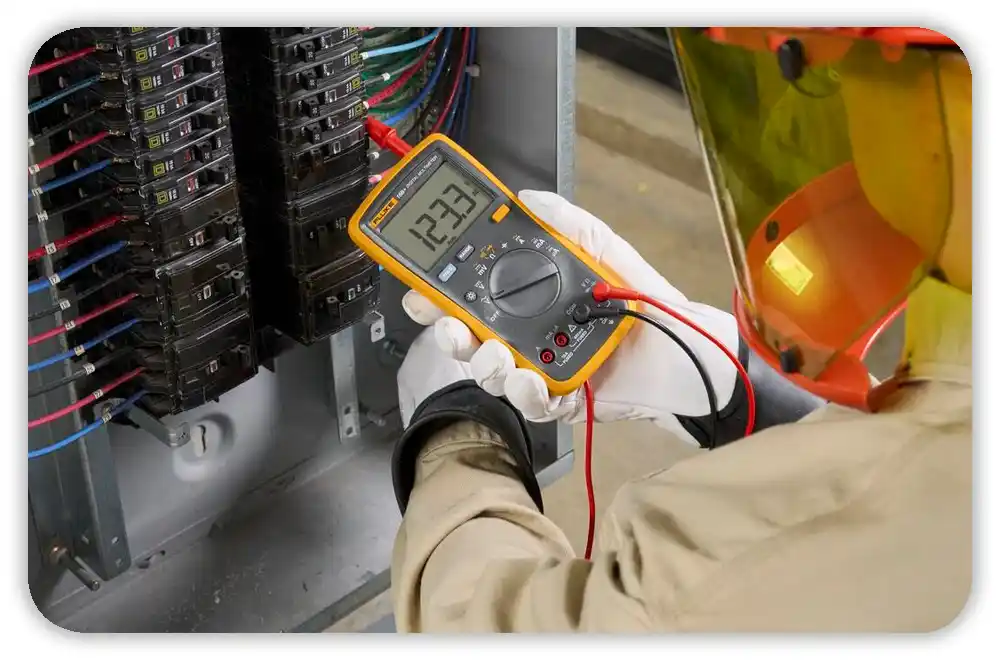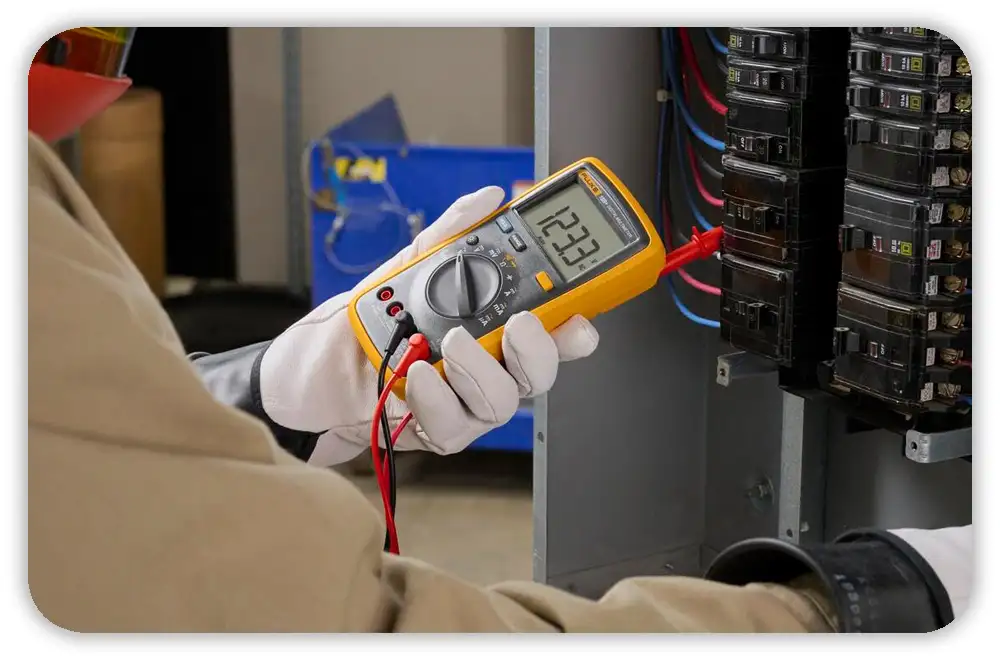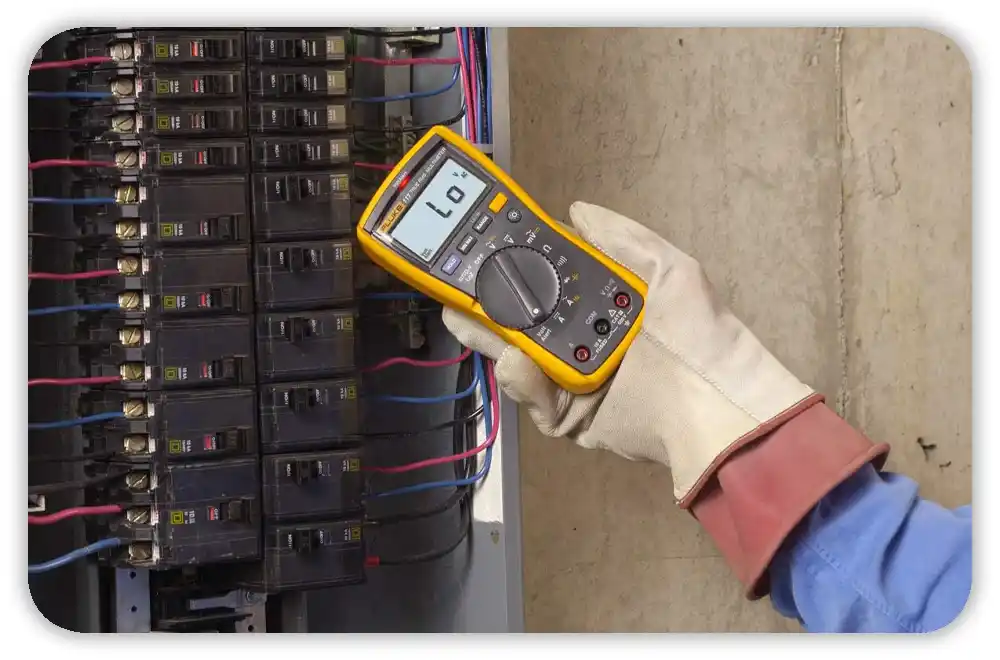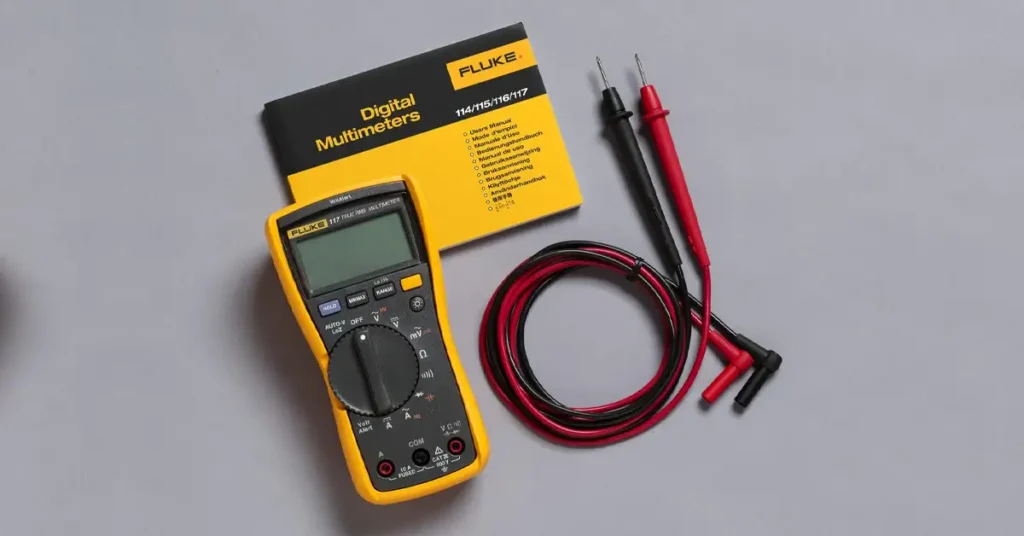Ever stood in your garage with a bunch of wires and thought, which Fluke multimeter should I buy? I’ve been there too — testing tools in hot Florida shops, cold Midwest basements, and dry Arizona garages. The right meter can save you time and keep you safe. It’s the difference between a quick fix and a long headache.
Whether you’re checking voltage on a DeWalt drill, testing a Milwaukee battery, or tuning an HVAC motor, I’ve tried these meters side by side. Here’s what I found — and which Fluke model works best for your kind of job.
Table of Contents
What Makes Fluke Multimeters Worth Buying?
When I first used a Fluke meter, I saw it wasn’t just another tool. It was built to last. I’ve dropped mine, used it in humid Florida heat, and even in cold Michigan winters — and it still read perfectly. That’s when I knew Fluke makes tools for real work, not just for show.
Fluke meters stand out for three main reasons — precision, durability, and safety. They meet global CAT ratings and follow OSHA and ANSI standards. From home use to high-voltage panels, they’re trusted everywhere.
Fluke isn’t the cheapest, but it’s built to protect you and give lab-level accuracy — wherever you work.
The Core Benefits of Fluke Multimeters
Here’s why I keep using Fluke after testing many other meters:
- True-RMS accuracy: Fluke gives correct readings on modern electronics — no false results with LED lights or power supplies.
- Rugged build: Many models survive 3–4 meter drops. I’ve dropped mine off a ladder — still works fine.
- Trusted safety: CAT III and CAT IV ratings mean they’re ready for commercial or industrial jobs.
- Weather protection: Models like the 87V MAX and 28 II are IP67-rated — dustproof and waterproof.
- Lifetime support: You can recalibrate them in U.S. service centers anytime.
Fluke’s strength is simple — it’s made for pros who need tools that last.
Fluke vs. Other Brands (Milwaukee, Klein, DeWalt)
I’ve used most big-name meters — Milwaukee, Klein, and DeWalt. They all work well, but Fluke still leads when you care about accuracy and safety.
- Milwaukee: Tough and durable, but less precise. Great for general work, not fine tests.
- Klein: Affordable and reliable, but many models lack True-RMS. That matters for modern systems.
- DeWalt: Solid for basic jobs but misses advanced filters and calibration support.
Fluke brings it all — precision, calibration, and safety. It’s the one brand I trust to handle long days and rough sites.
How to Choose the Right Fluke Multimeter for Your Work
Many people overspend or buy the wrong model. You don’t need the most expensive Fluke — you need the right one for your job.

Here’s how I choose the best fit.
Step 1 — What Kind of Work Do You Do?
- Residential / Commercial Electrician: You’ll want CAT III 600V safety and LoZ mode. Go for the Fluke 117.
- HVAC Tech: You need temperature and capacitance. Pick the Fluke 116.
- Industrial Engineer: Go for True-RMS, CAT IV, and a low-pass filter. The Fluke 87V is the pro’s choice.
- Auto Tech: Look for fast Min/Max and diode tests. The Fluke 88V is made for cars.
- Homeowner / Hobbyist: You just need voltage, continuity, and resistance. Try the Fluke 101 or 107.
Step 2 — Where Will You Use It?
Your work area affects your choice.
- Indoors: IP30 or IP40 is fine. Try the Fluke 115 or 117.
- Outdoors / Harsh sites: Choose IP67 waterproof models like the Fluke 87V MAX or 28 II.
- Hazardous zones: For oil or chemical plants, go with Fluke 28 II Ex — it’s ATEX certified.
Step 3 — What’s Your Budget?
How often you use your meter should guide your spend:
- Under $150: Best for DIY users — Fluke 101, 107, or 15B+.
- $250–$400: For pros — Fluke 115, 117, or 179.
- $450–$700: For industrial users — Fluke 87V, 87V MAX, or 28 II.
- $700+: For engineers — Fluke 289 with data logging.
If your meter helps you earn, don’t cheap out. Buy once, use it for years.
What Are Fluke’s Multimeter Series and Who Are They For?
Fluke builds different series for different needs. Once I learned what each one was for, picking became simple.
Fluke 110 Series – Everyday Workhorses
Compact, light, and accurate — perfect for electricians.
- CAT III 600V safety and True-RMS.
- Fits in one hand, easy to carry.
Top picks: Fluke 117 (non-contact detect), 116 (for HVAC), 115 (all-around use).
Ideal for residential and commercial work.
Fluke 170 & 80-V Series – Industry Standards
Trusted across factories and plants.
- CAT IV 600V / CAT III 1000V safety.
- Accuracy between 0.09–0.05%.
Fluke 179 adds temperature. Fluke 87V is the go-to for tough, precise jobs.
If you want one meter to last a career, start here.
Fluke 28 II & 87V MAX – Rugged and Waterproof
Built for the outdoors and the toughest conditions.
- IP67-rated for dust and water.
- Drop-tested up to 4 meters.
Great for linemen, field techs, and mining work. I’ve used the 87V MAX in rain, mud, and heat — it never failed.
Fluke 287/289 – Data Logging Powerhouses
Made for engineers and R&D pros.
- TrendCapture logging and 50,000-count resolution.
- Great for automation and diagnostics.
I use the Fluke 289 for long-term fault tracking — it saves hours of guesswork.
Fluke 101/107/17B+ – Entry-Level Choices
For DIYers and students who want safety and simplicity.
- CAT III 600V safety and compact design.
- Fluke 107 adds a backlight and current test.
They’re small, reliable, and perfect for home or auto work.
Final Thought
Fluke multimeters may cost more upfront, but they earn that price every day. They stay accurate, survive harsh work, and keep you safe — year after year.
If you want a meter that works as hard as you do, go with Fluke.
Which Fluke Multimeter Is Best for Electricians?

People ask me this all the time — “Which Fluke multimeter should I buy?”
The honest answer: there’s no single “best” one for everyone. The right choice depends on your daily work. I’ve tested these meters for years — in homes, workshops, and industrial plants. Here’s what I’ve learned.
Fluke meters stand out because they’re safe, fast, and reliable — three things every electrician needs. Below are the best picks by trade, based on real job use.
Best for Residential & Commercial Electricians — Fluke 117
If you spend your days wiring outlets or fixing lights, the Fluke 117 is a must-have. I’ve used mine on hundreds of jobs. It’s small, quick, and dead accurate.
- VoltAlert™ helps detect live wires without contact.
- LoZ mode clears ghost voltage from conduit lines.
- CAT III 600V rating keeps you safe on building wiring.
- One-hand design makes it easy to use in tight panels.
It’s the perfect mix of size and power.
Best for Industrial Technicians — Fluke 87V
When I worked in industrial plants, the Fluke 87V was my go-to. It’s made for places where precision matters most — control systems, motors, and high-voltage circuits.
- True-RMS + Low-Pass Filter keeps readings steady on noisy VFDs.
- CAT IV 600V / CAT III 1000V for top-level safety.
- Measures temperature and frequency for full diagnostics.
- Offers 0.05% accuracy — that’s lab-grade precision.
It’s not tiny, but it’s built tough.
Best for HVAC Pros — Fluke 116
If you work on heating or cooling systems, the Fluke 116 is your best tool. It’s made just for HVAC/R techs.
- Has a built-in thermometer for coil and air temp checks.
- Microamp range lets you test flame sensors.
- Capacitance mode diagnoses motors and compressors.
- Compact enough for tight furnaces and rooftops.
I’ve used it for years — it saves time by combining key HVAC features.
Best for Auto Technicians — Fluke 88V
For auto electricians, nothing beats the Fluke 88V. I’ve used it on everything from old trucks to modern hybrids.
- Measures RPM, dwell, and duty cycle for ignition testing.
- Fast Min/Max capture spots short sensor faults.
- Built with auto-grade leads that resist oil and heat.
It’s just as good for checking alternators as it is for reading sensors.
Best for Harsh Job Sites — Fluke 87V MAX / 28 II
Working outdoors or on tough sites? The Fluke 87V MAX and 28 II can take it all.
- IP67 waterproof and dustproof — handles storms or spills.
- Drop-tested up to 4 meters — mine once hit concrete and lived.
- Works in freezing or desert heat without issues.
These are the ones I grab for oil fields, mines, or outdoor power jobs.
Best for Homeowners & Hobbyists — Fluke 101 or 107
If you’re just starting out or fixing things at home, go simple. The Fluke 101 and 107 are small, safe, and easy to use.
- Measures voltage, resistance, and continuity.
- Lightweight for quick checks.
- The 107 adds current testing and a backlight.
- CAT III 600V rated for home safety.
They’re affordable but still built like pro tools.
What Safety Ratings Should You Check?
I’ve seen people test live panels with cheap meters — and it’s scary. Safety isn’t optional. Fluke meets IEC 61010, OSHA, and ANSI standards, built for the real risks electricians face.
Understanding CAT Ratings
CAT ratings show how much energy a meter can handle safely.
- CAT IV: Highest protection — for service entrances or outdoor conductors.
- CAT III: For panels, wiring, and 3-phase systems.
- CAT II: For plug-in devices and appliances.
When in doubt, go higher. Most U.S. commercial and industrial work needs CAT III 600V or CAT IV 600V.
Understanding IP Ratings
IP ratings matter more than most people think. I learned that after soaking one in a storm.
- IP30–IP40: Basic protection for dry, indoor work.
- IP67: Fully dustproof and waterproof — handles rain or splashes.
If you work in humid states like Florida or snowy areas like Minnesota, IP67 is worth it.
PPE and OSHA Basics
Even with a Fluke, safety gear matters.
Before testing live power, I always check:
- My leads are clean and unbroken.
- I’m wearing insulated gloves and glasses.
- My tools are CAT-rated and voltage safe.
These steps take seconds but can prevent accidents.
What Features Matter Most?
Fluke packs in tons of features, but not all are essential. I’ve bought fancy meters before and barely used half the functions.

Here’s what’s truly worth paying for.
Must-Have Features
- True-RMS: Reads modern electronics accurately.
- LoZ Mode: Removes ghost voltages.
- Min/Max Record: Catches spikes and drops.
- Backlit Display: Handy for dark basements or panels.
If your meter has these, you’re set.
Premium Features (If You Need Them)
These are great for advanced users, but not everyone needs them:
- TrendCapture Logging (Fluke 287/289): Tracks long-term data.
- Bluetooth (Fluke Connect): Sends readings to your phone.
- Built-In Thermometer (116, 179, 87V): Perfect for HVAC or panels.
- Low-Pass Filter (87V, 28 II): Filters noise for VFDs.
If you do automation or engineering work, they’re worth it.
Common Mistakes When Buying a Multimeter
I’ve made a few of these mistakes myself — and I’ve seen many pros do the same. It’s easy to grab a meter because it’s cheaper or has lots of features. But when you’re standing in front of a live panel or working in bad weather, those small choices matter. Here’s what to watch for.
Buying on Price, Not on Safety or Accuracy
I once thought all meters worked the same — until a cheap one gave me a false reading on a live circuit. That was enough for me to switch to Fluke for good.
Always check the CAT rating first, not the price tag. A $40 meter might seem fine at home, but it’s risky on a 480V line.
Ignoring IP and Drop-Test Ratings
If you’ve worked outdoors — in the rain, on a roof, or inside a cold shed — you know how rough it can get. I once dropped my meter off a ladder onto concrete. It survived because it was built for that.
Models like the Fluke 87V MAX and Fluke 28 II are IP67 waterproof and drop-tested up to 4 meters.
Overbuying Features You’ll Never Use
Many people spend more on fancy features they don’t need — like Bluetooth or data logging. Those are great for engineers, but not for most electricians or homeowners.
Skipping Calibration or Buying from Fake Sellers
Never buy Fluke meters from sketchy online stores. Fake ones look real until the readings start drifting. I always buy from authorized U.S. dealers or trusted tool suppliers.
Also, get your meter recalibrated every few years if you use it often. It keeps readings accurate and safe.
Final Verdict — Which Fluke Multimeter Is Right for You?
After testing many Fluke models in homes, garages, and job sites, I’ve learned one thing: the best multimeter depends on your work. There’s no one-size-fits-all — only what fits your needs and budget.
- Fluke 117: Best for electricians. Compact, safe, and fast for daily fieldwork.
- Fluke 87V: Ideal for industrial use. Rugged and precise even in noisy systems.
- Fluke 116: Great for HVAC pros. Handles temperature and microamp tests.
- Fluke 107: Perfect for DIY users. Simple, safe, and affordable.
- Fluke 87V MAX: Built for outdoor or rough jobs. Almost indestructible.
Every Fluke I’ve owned has paid for itself in time and accuracy. Buy right once — and it’ll serve you for years.
Quick Comparison — Best Fluke Multimeters (2025)
| Model | Best For | Key Features | Price (USD) | Safety Rating |
| Fluke 117 | Electricians | LoZ, VoltAlert™, 10A | $250–$305 | CAT III 600V |
| Fluke 116 | HVAC/R | Temp, µA, Capacitance | $235–$290 | CAT III 600V |
| Fluke 87V | Industrial | True-RMS, LPF, Temp | $450–$560 | CAT IV 600V / CAT III 1000V |
| Fluke 87V MAX | Harsh Sites | IP67, 4m Drop | $520–$640 | CAT IV 600V |
| Fluke 179 | General Use | True-RMS, Temp | $400–$510 | CAT IV 600V |
| Fluke 107 | DIY / Apprentice | Compact, 10A, Backlight | $130–$160 | CAT III 600V |
| Fluke 101 | Home Use | Basic Voltage, Resistance | $45–$75 | CAT III 600V |
Prices can vary by state. Coastal areas often cost more. Always buy from verified U.S. distributors for full warranty coverage.
FAQs — Fluke Multimeter Buying Questions
What is the most accurate Fluke multimeter?
The Fluke 87V and Fluke 289 are top choices for precision. The 87V offers ±0.05% accuracy, perfect for industrial work. The 289 goes even deeper at ±0.025% — great for labs.
Which Fluke multimeter is best for beginners?
Start with the Fluke 107 or Fluke 101. They’re small, simple, and safe — perfect for home projects or learning the basics.
What’s the difference between True-RMS and average-responding meters?
True-RMS meters read complex waveforms (like from LED drivers or VFDs) accurately. Average-responding meters can be off by 10–40%. I noticed this first when testing LED lights — cheaper meters gave false readings.
How long do Fluke multimeters last?
With care, most Fluke meters last 10–20 years. I’ve used one for over a decade with no issues. Keep it clean, store it dry, and recalibrate when needed.

